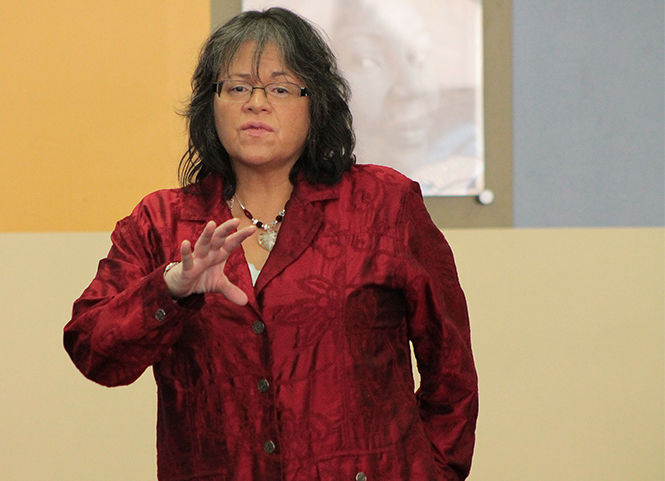Kent students learned every side of the War of 1862 at Soup and Substance event
Kimberly Medicinehorn Jackson discusses the Dakota Hangings of 1862 at Soup and Substance in the Student Multicultural Center in the Student Center on Thursday, Nov. 20, 2014.
November 20, 2014
A small group of Kent State faculty and students gathered in the Student Multicultural Center in the Student Center on Thursday to hear about the Dakota Hangings of 1862.
Kimberlee Medicine-Horn Jackson, an English adjunct faculty member at Kent State Geauga, began her speech by telling the audience she believes every footstep taken to get them where they are here was destined.
Jackson, a member of the Yankton Sioux tribe, also goes by the name Cante Wasté Wiņ, which means “good-hearted woman.”
Jackson said for native people, names have a great significance. A name can show more about a person, and Jackson said there’s always more than one side to a story, which was the focus of her speech.
Jackson retold the history of the hangings of 38 members of the Dakota tribe in 1862. Nearly 4,000 people came out to watch these hangings because of broken treaties between the Sioux tribe and the United States government.
“The viewpoint of who is human and who is not is one of the focus points of the event,” Jackson said. “When you focus on the nuances of language, it can alter the way you look at something.”
When she first spoke of the event, Jackson talked about how the United States broke promises made to the Sioux people and how the Sioux people fought back by stealing food from the colonists only to be able to provide for their families.
After her speech on the war, Jackson showed the first 15 minutes of “The Dakota 38 + 2 Memorial Ride,” a documentary about the ride the Sioux take to remember those hanged during the War of 1862. The memorial ride ended at Reconciliation Park in Mankato, Minnesota, where the hangings took place. This is now where speeches and educational materials about the war are held, and a statue of a white buffalo stands to remind people to try to live life the right way.
Jackson asked the audience what spoke to them about the documentary. One member, senior communication studies major Crystal Bower, said that the United States holds Lincoln as a hero for freeing the slaves, but never see this side of him.
Jackson used this to bring back her point of multiple sides to a story and explain the recovery that the Sioux go through.
“It’s important to forgive in the sense that it’s nothing good to live with a grudge,” Jackson said. “There’s a difference between forgiving and forgetting. We don’t want to forget the injustice.”
Bower came to the event of her own accord, despite being enrolled in an Intercultural Communication class.
“I came for the historical aspect,” she said. “The part that we’re not taught in school. My sons aren’t learning it in school. It’s important learning things other than what you are traditionally taught.”
Kim Kennedy, special assistant for the Division of Diversity, Equity and Inclusion, said she is planning more events like this one for the spring semester and attempting to approach faculty members who are self-identifying as Native American to come in and speak with Kent State students.
“It’s great to have all of these diverse people come in and speak with the students,” she said. “Knowing we run events like these is a beautiful thing.”
The audience discussion of their feelings from the documentary led into talk of current-day effects of the War of 1862. Before the Memorial Ride was in place, the current mayor of Mankato didn’t know that the 38 hangings took place.
Jackson looked the audience over before asking, “How often do you think about Native Americans when you aren’t a Native American?”
Contact Tristan Buirley at [email protected].












